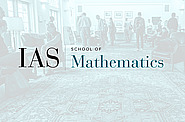2005-2006 seminars
Feb
14
2006
Lie Groups, Representations and Discrete Mathematics
Generalized Harmonic Maps Superridity and Uniformly Convex Metric Spaces
Tsachik Gelander
2:00pm|S-101
Feb
14
2006
Computer Science/Discrete Mathematics Seminar II
Quantum Computing and Finite Permutation Groups
Aner Shalev
10:30am|S-101
Feb
13
2006
Computer Science/Discrete Mathematics Seminar I
Cohomology in Grothendieck Topologies and Lower Bounds in Boolean Complexity
Joel Friedman
11:15am|S-101
Jan
31
2006
Lie Groups, Representations and Discrete Mathematics
Paley Graphs and the Combinatorial Topology of the Bruhat Decomposition
Ron Livnè
2:00pm|S-101
Jan
31
2006
Jan
30
2006
Computer Science/Discrete Mathematics Seminar I
From Trees to General Graphs: Counting Independent Sets up to the Tree Threshold
11:15am|S-101
Jan
24
2006
Lie Groups, Representations and Discrete Mathematics
The Classification of Finite Simple Groups: Aspects of the Second Generation Proof
Inna Korchagina
2:00pm|S-101
Jan
24
2006
Jan
23
2006
Computer Science/Discrete Mathematics Seminar I
Dispersion of Mass and the Complexity of Randomized Algorithms
Santosh Vempala
11:15am|S-101
